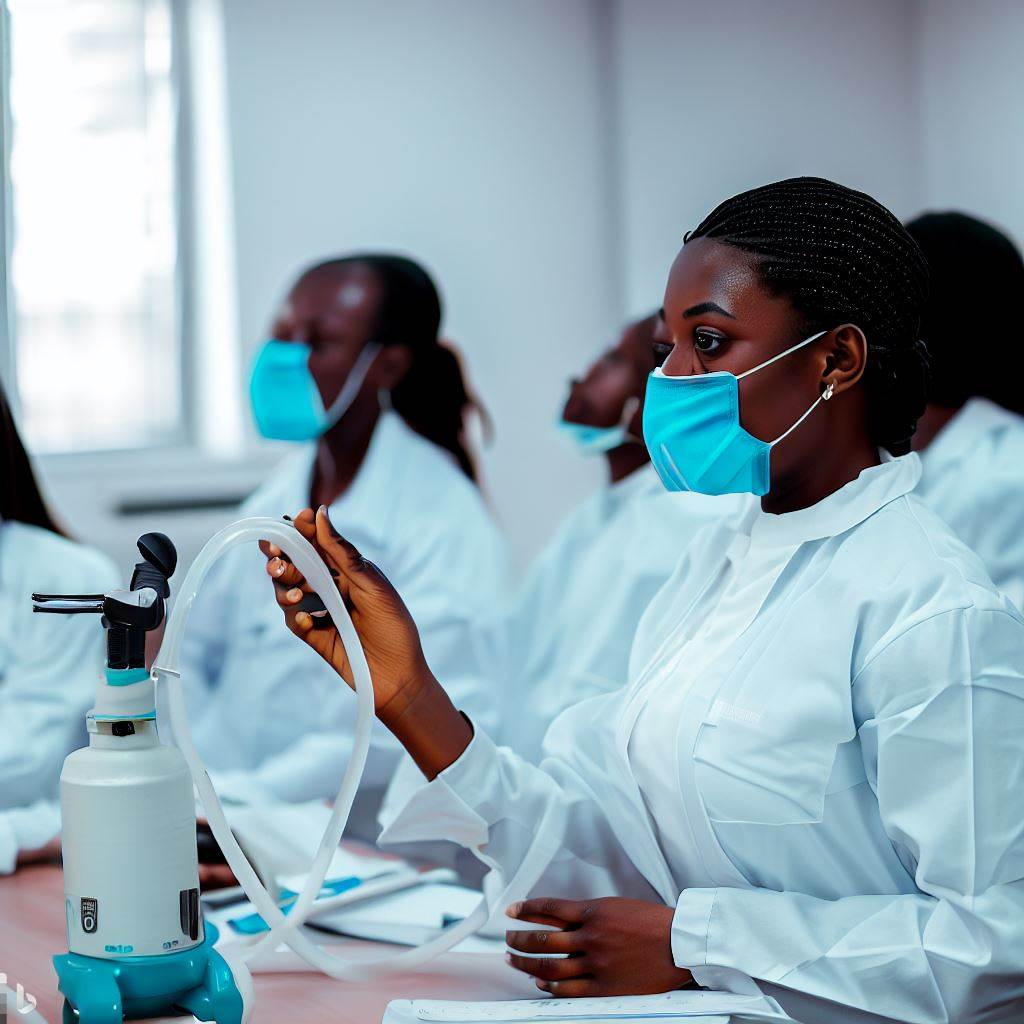Introduction
The role of Nigerian respiratory therapists holds immense significance in the rapidly growing field of respiratory therapy within the country’s healthcare system.
These healthcare professionals play a crucial role in managing respiratory conditions and ensuring patients receive appropriate care.
Nigerian respiratory therapists are trained experts who specialize in evaluating and treating disorders related to the respiratory system.
Their responsibilities encompass assessing patients, conducting diagnostic tests, and developing personalized treatment plans.
They administer therapies such as oxygen administration, inhalation therapy, and mechanical ventilation to help patients breathe more comfortably.
Moreover, these professionals collaborate closely with physicians, nurses, and other healthcare team members to provide comprehensive care and contribute to improved patient outcomes.
They also educate patients and their families on managing respiratory conditions effectively and promoting a healthier lifestyle.
As the demand for specialized respiratory care increases, the role of Nigerian respiratory therapists continues to grow in importance, making a positive impact on the overall well-being of patients and the healthcare system as a whole.
What is Respiratory Therapy?
Definition and explanation of respiratory therapy
Respiratory therapy is a healthcare profession that focuses on the treatment and management of lung and breathing disorders.
Respiratory therapists are specialized healthcare professionals who work closely with doctors and nurses to provide respiratory care to patients.
They have expertise in diagnosing and treating respiratory conditions, such as asthma, chronic obstructive pulmonary disease (COPD), and pneumonia.
Focus on its specialization in treating lung and breathing disorders
Respiratory therapists play a crucial role in helping patients with respiratory issues breathe properly and improve their overall lung function.
They are responsible for administering various medical treatments, including oxygen therapy, nebulizer treatments, and chest physiotherapy.
Respiratory therapists also perform diagnostic tests to assess lung function, such as pulmonary function tests and arterial blood gas analysis.
They collaborate with other healthcare professionals to develop and implement treatment plans for patients with respiratory conditions.
Distinction from other healthcare professions such as doctors and nurses
Respiratory therapists work in various healthcare settings, including hospitals, clinics, and home healthcare.
They may also be part of emergency response teams, providing immediate respiratory support during emergencies or disasters.
Respiratory therapy is a specialized field that requires in-depth knowledge and skills.
Respiratory therapists undergo rigorous education and training to become proficient in their field.
They typically have a bachelor’s degree in respiratory therapy, although some may have an associate’s degree.
In addition to formal education, respiratory therapists must obtain a license to practice in their respective states.
Respiratory therapy is distinct from other healthcare professions, such as doctors and nurses.
While doctors focus on diagnosing and treating various medical conditions, respiratory therapists specialize in respiratory care.
Nurses, on the other hand, provide overall patient care and may assist respiratory therapists in implementing treatment plans.
Respiratory therapists work closely with doctors, nurses, and other healthcare professionals to ensure coordinated patient care.
They play a vital role in managing and improving the respiratory health of patients of all ages, from infants to the elderly.
Essentially, respiratory therapy is a specialized healthcare profession that focuses on the treatment and management of lung and breathing disorders.
Respiratory therapists have expertise in diagnosing and treating respiratory conditions, and they work closely with doctors and nurses to provide respiratory care to patients.
They play an essential role in helping patients breathe properly and improve their overall lung function.
Respiratory therapists undergo extensive education and training and work in various healthcare settings to provide respiratory care to patients of all ages.
Read: The Journey to Becoming a Registered Nurse in Nigeria
Education and training of Nigerian respiratory therapists
In order to become a respiratory therapist in Nigeria, individuals must meet certain academic requirements.
These requirements serve as the foundation for their education and training in this field.
Academic requirements for becoming a respiratory therapist in Nigeria
- Prior to pursuing a career in respiratory therapy, individuals must have at least a secondary school certificate or its equivalent.
- It is also necessary to have a strong background in science-related subjects such as biology, chemistry, and physics.
- These academic prerequisites provide aspiring respiratory therapists with a solid foundation for their further education and training.
Overview of programs and institutions offering respiratory therapy education
In Nigeria, there are several programs and institutions that offer respiratory therapy education to interested individuals.
These programs aim to equip students with the necessary knowledge and skills to excel in this field.
- One such institution is the University of Lagos, which offers a Bachelor’s degree program in Respiratory Therapy.
- Lagos State University Teaching Hospital also provides a training program for respiratory therapists.
- Other institutions, such as the Federal Medical Centre in Abuja, offer certificate and diploma courses in respiratory therapy.
These programs and institutions play a crucial role in shaping the future of respiratory therapy in Nigeria by providing quality education and training to aspiring professionals.
Emphasis on the importance of practical training and hands-on experience
In addition to theoretical knowledge, practical training and hands-on experience are vital aspects of respiratory therapy education in Nigeria.
These elements enable students to apply their knowledge in real-life situations and develop the necessary skills for their future careers.
- During their training, students are exposed to various clinical settings where they interact with patients and gain practical experience.
- These hands-on experiences allow aspiring respiratory therapists to develop critical thinking, problem-solving, and communication skills.
- Practical training also includes the use of respiratory equipment and the implementation of therapeutic techniques under the guidance of experienced professionals.
By emphasizing practical training, respiratory therapy programs in Nigeria ensure that graduates are well-prepared to meet the demands of their profession and provide quality care to patients.
Overall, the education and training of Nigerian respiratory therapists are essential for their success in this field.
Aspiring professionals must meet certain academic requirements and undergo comprehensive training programs to gain the necessary knowledge and skills.
Through a combination of theoretical education and practical experience, these individuals can make a significant impact on respiratory healthcare in Nigeria.
Scope of Practice for Nigerian Respiratory Therapists
Respiratory therapists play a crucial role in the healthcare system, particularly in the assessment, treatment, and management of respiratory conditions.
In Nigeria, these professionals have specific responsibilities and tasks that contribute to the overall care of patients.
Description of Specific Responsibilities and Tasks
- Conducting patient assessments to evaluate respiratory function and identify potential issues.
- Performing diagnostic tests, such as spirometry, to measure lung capacity and assess lung function.
- Administering respiratory treatments, including oxygen therapy, medication delivery, and breathing exercises.
- Monitoring patients during therapy sessions and adjusting treatment plans based on their responses.
- Assisting with the management of mechanical ventilators for patients who require assisted breathing.
- Providing education to patients and their families about respiratory conditions and self-care techniques.
- Collaborating with other healthcare professionals to develop comprehensive care plans for patients.
- Participating in team discussions and sharing findings to contribute to the diagnosis and treatment process.
- Using specialized equipment, such as nebulizers and chest percussion devices, to aid in respiratory therapy.
- Documenting patient information, treatment plans, and progress in medical records accurately.
The responsibilities and tasks of Nigerian respiratory therapists are focused on improving the respiratory health of patients.
Their expertise and knowledge in respiratory care make them essential members of the healthcare team.
Assessing, Treating, and Managing Respiratory Conditions
Nigerian respiratory therapists play a critical role in assessing, treating, and managing various respiratory conditions that affect individuals of all ages.
They apply their skills and knowledge to enhance the overall respiratory function and quality of life for their patients.
When it comes to assessing respiratory conditions, respiratory therapists utilize a range of diagnostic tools and techniques.
They conduct thorough evaluations of patients’ lung capacity, oxygen levels, and overall respiratory function. This initial assessment helps them identify potential abnormalities or issues that require intervention.
Once respiratory conditions are diagnosed, Nigerian respiratory therapists develop and implement personalized treatment plans for their patients.
These plans may involve a combination of therapies, exercises, medication administration, and other interventions. The goal is to optimize lung function, relieve symptoms, and promote overall well-being.
Moreover, respiratory therapists play a vital role in managing chronic respiratory conditions, such as chronic obstructive pulmonary disease (COPD) or asthma.
They collaborate closely with patients and other healthcare professionals to monitor and adjust treatment plans as necessary.
By doing so, they help minimize exacerbations and improve the long-term prognosis of individuals with these conditions.
Collaboration with Other Healthcare Professionals
The effective management of respiratory conditions often requires a multidisciplinary approach.
Nigerian respiratory therapists collaborate with various healthcare professionals, such as physicians, nurses, and physiotherapists, to ensure comprehensive patient care.
Respiratory therapists actively participate in team discussions, sharing their expertise and observations regarding patients’ respiratory status.
They contribute valuable insights that guide decision-making processes, ultimately leading to improved outcomes for patients.
This collaboration extends beyond the immediate care setting, as respiratory therapists play an essential role in facilitating effective transitions of care between different healthcare facilities.
Ultimately, the scope of practice for Nigerian respiratory therapists encompasses a wide range of responsibilities and tasks.
Their primary focus lies in assessing, treating, and managing respiratory conditions, while also actively collaborating with other healthcare professionals.
These dedicated professionals make a significant impact on the wellbeing of patients with respiratory issues, contributing to a better quality of life for people across Nigeria.
Read: Becoming a Phlebotomist in Nigeria: Steps and Requirements

Common Respiratory Conditions Treated by Nigerian Respiratory Therapists
Introduction to prevalent respiratory diseases in Nigeria
Nigeria faces a high burden of respiratory diseases due to various environmental and lifestyle factors.
Common respiratory conditions include asthma, chronic obstructive pulmonary disease (COPD), and pneumonia.
These conditions can be caused by infections, smoking, air pollution, and occupational hazards.
Poor access to healthcare and limited awareness contribute to the prevalence of respiratory diseases in Nigeria.
Discussion of conditions such as asthma, chronic obstructive pulmonary disease (COPD), and pneumonia
- Asthma is a chronic condition characterized by airway inflammation, coughing, and difficulty breathing.
- The main triggers for asthma in Nigeria include dust mites, pollen, smoke, and certain foods.
- Nigerian respiratory therapists play a pivotal role in managing asthma through education, medication administration, and breathing exercises.
- COPD refers to a group of progressive lung diseases, including chronic bronchitis and emphysema.
- Smoking is the leading cause of COPD in Nigeria, contributing to the increasing prevalence.
- Nigerian respiratory therapists assist COPD patients with breathing techniques, oxygen therapy, and pulmonary rehabilitation.
- Pneumonia is an infection of the lungs, commonly caused by bacteria, viruses, or fungi.
- Poor hygiene, overcrowding, and malnutrition are contributing factors to pneumonia in Nigeria.
- Respiratory therapists help manage pneumonia by administering antibiotics, providing oxygen support, and ensuring proper ventilation.
Overview of how respiratory therapists participate in the management of these conditions
- Nigerian respiratory therapists work alongside physicians to diagnose and develop treatment plans for patients with respiratory diseases.
- They conduct pulmonary function tests to assess lung capacity and evaluate the severity of respiratory conditions.
- Respiratory therapists educate patients on disease management, medication use, and lifestyle modifications.
- They provide assistance in the use of respiratory equipment, such as inhalers, nebulizers, and ventilators.
- Monitoring and evaluating patient response to treatment is an essential part of a respiratory therapist’s role.
- They collaborate with other healthcare professionals to ensure comprehensive care and optimize patient outcomes.
- Respiratory therapists play a vital role in respiratory emergency response, performing intubations and providing ventilation support.
- They contribute to public awareness campaigns to promote respiratory health and early detection of respiratory diseases.
- Continuous professional development and staying up-to-date with advancements in respiratory care are crucial for Nigerian respiratory therapists.
In short, Nigerian respiratory therapists play a significant role in managing common respiratory conditions such as asthma, COPD, and pneumonia.
Through their expertise and interventions, they contribute to improving patient outcomes and raising awareness about respiratory health in Nigeria.
Read: Cultural Competency for Pharmacy Technicians in Nigeria.
Equipment and Technology Used by Nigerian Respiratory Therapists
Explanation of essential tools and devices used in respiratory therapy
Respiratory therapists in Nigeria utilize various tools and devices to provide effective care to their patients.
These instruments play a vital role in diagnosing, treating, and managing respiratory conditions.
Let’s explore some of the essential equipment used by Nigerian respiratory therapists:
- Spirometers: Spirometers are devices used to measure lung capacity and assess lung function. They help determine the severity of respiratory conditions and monitor the progress of therapy.
- Suctioning equipment: Respiratory therapists often need to remove excessive secretions or blockages from the airways of patients. Suctioning equipment, such as suction catheters and devices, assists in ensuring patients’ airways remain clear.
- Pulse oximeters: These non-invasive devices measure the oxygen saturation levels in a patient’s blood. By providing real-time data, respiratory therapists can monitor whether sufficient oxygen is reaching the body’s vital organs.
- Oxygen concentrators: Oxygen concentrators are essential devices used to deliver oxygen therapy to patients with respiratory disorders. These devices filter and concentrate oxygen from the surrounding air, ensuring patients receive the required oxygen levels.
- Peak flow meters: Peak flow meters are handheld devices that measure a patient’s peak expiratory flow rate (PEFR). This measurement helps determine the effectiveness of asthma management or the severity of an asthma attack.
- Nebulizers: Nebulizers are widely used in respiratory therapy for delivering medication directly to the lungs. They convert liquid medication into a fine mist, making it easier for patients to inhale and absorb medication effectively.
Detailed description of ventilators, nebulizers, and oxygen delivery systems
Ventilators play a crucial role in respiratory therapy as they provide necessary support for patients who have difficulty breathing on their own.
These devices assist with delivering controlled amounts of oxygen and regulating the patient’s respiratory rate.
Nebulizers, as mentioned earlier, deliver medication directly into the lungs.
They are especially useful in managing conditions such as asthma, chronic obstructive pulmonary disease (COPD), and cystic fibrosis.
Oxygen delivery systems encompass various devices used to deliver oxygen to patients.
These systems include nasal cannulas, oxygen masks, and high-flow nasal oxygen (HFNO) systems. The choice of delivery system depends on the patient’s condition and oxygen requirements.
Highlighting the role of respiratory therapists in maintaining and operating this equipment
Respiratory therapists in Nigeria are responsible for the proper maintenance and operation of the equipment mentioned above.
They undergo specialized training to ensure the safe and effective use of these devices.
These professionals regularly inspect and calibrate equipment to guarantee accurate readings and optimal performance.
They troubleshoot any issues that may arise, ensuring minimal disruption to patient care.
Additionally, respiratory therapists educate patients and their families on how to use and care for the equipment at home.
In fact, the equipment and technology used by Nigerian respiratory therapists are vital in providing effective respiratory care.
These tools enable accurate diagnostics, efficient treatment, and ongoing support for patients with respiratory conditions.
Respiratory therapists play a crucial role in maintaining and operating this equipment to ensure the best possible outcomes for their patients’ respiratory health.
Read: The Role of a Pharmacy Technician in Patient Safety in Nigeria
Importance of Nigerian Respiratory Therapists in Public Health
Discussion of the Burden of Respiratory Diseases in Nigeria
Respiratory diseases pose a significant burden on the Nigerian population, leading to increased morbidity and mortality rates.
Respiratory diseases such as asthma, chronic obstructive pulmonary disease (COPD), tuberculosis, and pneumonia are prevalent in Nigeria.
The lack of clean air, poor hygiene practices, environmental pollution, and inadequate healthcare resources contribute to the high prevalence of these diseases.
Description of How Respiratory Therapists Contribute to Preventative Measures and Health Promotion
Nigerian respiratory therapists play a crucial role in preventing and managing respiratory diseases through various interventions.
They assess patients’ lung function, conduct diagnostic tests, and develop individualized treatment plans.
Respiratory therapists provide education and counseling on lifestyle modifications, including smoking cessation and proper ventilation practices.
They also collaborate with other healthcare professionals to develop and implement respiratory rehabilitation programs.
Emphasis on the Role of Education and Awareness Campaigns Conducted by Respiratory Therapists
Education and awareness campaigns are vital in raising public knowledge about respiratory health and prevention strategies.
Nigerian respiratory therapists organize community outreach programs to educate the public on the early signs and symptoms of respiratory diseases.
They emphasize the importance of timely diagnosis and proper management to reduce disease progression and complications.
Respiratory therapists also advocate for the implementation of policies and regulations that promote clean air and reduce exposure to environmental pollutants.
In review, Nigerian respiratory therapists play a crucial role in public health by addressing the burden of respiratory diseases.
Through their expertise in prevention, diagnosis, and treatment, they contribute to improving the overall respiratory health of the Nigerian population.
Their education and awareness campaigns serve as a powerful tool in promoting respiratory health and reducing the morbidity and mortality associated with respiratory diseases.
Read: Understanding the Role of an MRI Technologist in Nigeria
Career Opportunities for Nigerian Respiratory Therapists
In Nigeria, respiratory therapists have a wide range of career opportunities in various healthcare settings.
These professionals play a crucial role in providing respiratory care services to patients with breathing difficulties.
Let’s explore the potential employment settings, demand for respiratory therapists, and prospects for growth in this field.
Potential employment settings
- Hospitals: Respiratory therapists are vital members of healthcare teams in hospitals, where they provide care to patients in critical care units, emergency departments, and general wards.
- Clinics: Many clinics, including specialized respiratory clinics, employ respiratory therapists to provide diagnostic tests, administer treatments, and educate patients about respiratory conditions.
- Research institutions: Respiratory therapists can work in research institutions, where they contribute to studies related to respiratory diseases, treatment methods, and technological advancements.
Demand for respiratory therapists in Nigeria’s healthcare system
The demand for respiratory therapists in Nigeria is steadily increasing due to several factors.
First and foremost, the prevalence of respiratory diseases, such as asthma, chronic obstructive pulmonary disease (COPD), and pneumonia, is on the rise.
This has resulted in a greater need for specialized respiratory care services.
Furthermore, Nigeria’s healthcare system is evolving, and there is a growing recognition of the importance of respiratory therapy in patient care.
As a result, more healthcare facilities are recognizing the value of respiratory therapists and creating positions specifically for them.
Prospects for professional growth and specialization
Respiratory therapists in Nigeria have promising prospects for professional growth and specialization.
As they gain experience and expand their skills, they can take on more advanced roles and responsibilities.
Respiratory therapists can specialize in specific areas such as sleep medicine, neonatal care, and pulmonary rehabilitation.
Specialization allows them to develop expertise in particular areas of respiratory care and opens doors to advanced career opportunities and higher pay.
Additionally, respiratory therapists can pursue higher education and obtain advanced degrees in fields such as respiratory therapy education, management, or research.
These degrees can further enhance their knowledge and skills, making them eligible for leadership roles and academic positions.
In summary, Nigerian respiratory therapists have a range of career opportunities available to them. They can work in hospitals, clinics, and research institutions, providing critical respiratory care services.
The demand for respiratory therapists is increasing in Nigeria’s healthcare system, driven by the rising prevalence of respiratory diseases.
Furthermore, respiratory therapists can experience professional growth and specialization by expanding their skills and pursuing advanced education.
With these opportunities, respiratory therapists play a vital role in improving the respiratory health of Nigerians and contributing to the advancement of healthcare in the country.
Conclusion
Throughout this blog post, we have discussed the vital role of Nigerian respiratory therapists in improving respiratory health.
We have learned that respiratory therapists play a crucial part in diagnosing, treating, and managing respiratory conditions in patients.
Some key points we have covered include the extensive education and training required to become a respiratory therapist, the various responsibilities they have in patient care, and the importance of their expertise in respiratory treatments.
In the end, Nigerian respiratory therapists are essential healthcare professionals who contribute significantly to the well-being of patients with respiratory issues.
Their dedication, knowledge, and skills enable them to provide specialized care and improve respiratory health outcomes.
As readers, it is crucial to remember the valuable role that Nigerian respiratory therapists play in our healthcare system.
If you or a loved one are facing respiratory challenges, seek the guidance and support of these professionals.
To further understand the role of Nigerian respiratory therapists, you can explore additional resources, including research articles, medical journals, and professional organizations dedicated to respiratory care.
By advocating for and supporting this growing profession, we can ensure that respiratory health in Nigeria continues to improve.




